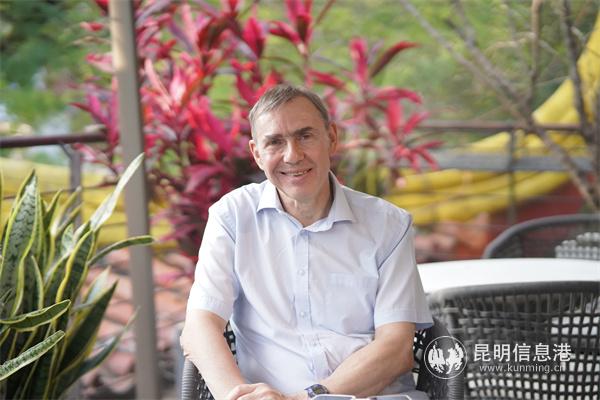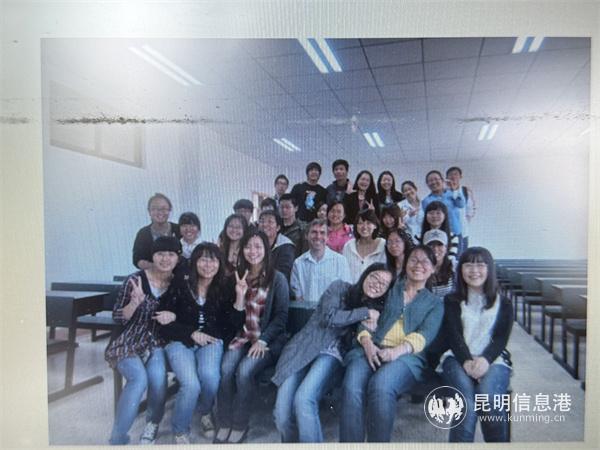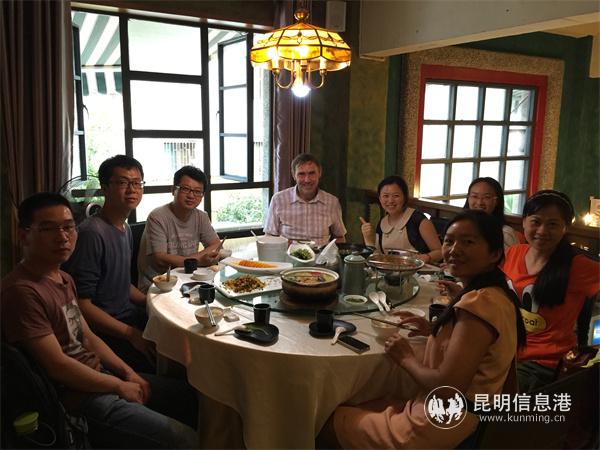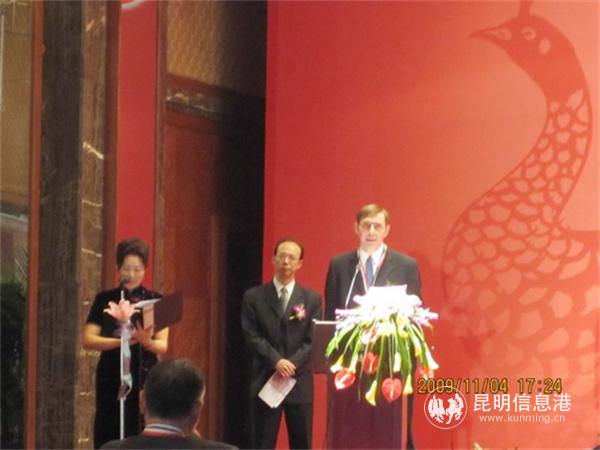Dreamlike Encounters: David's Extraordinary Adventures in Kunming
Source: InKunming | 2024-11-08 | Editor:Jennifer
In the tranquil campus of Yunnan University, David Christopher Lewis strolls along the tree-lined paths, sunlight filtering through the leaves, casting dappled shadows on his shoulders. As he steps into the classroom, his fluent English fills the room, sparking lively and profound discussions with his students on ethnological topics.
In the corner of a quiet café, the reporter meets David. Dressed in a light blue shirt, his demeanor exudes a quiet elegance and calm. His hair has turned silver, and fine lines mark the passage of time around his eyes, yet his gaze remains bright, brimming with a love for life and a profound affection for this city.
During the conversation, David smiles often, his voice steady, carrying the rich tones of his British accent. Each sentence seems to unfold like a well-told story, deliberate and measured. When the topic shifts to his connection with Kunming, his expression softens, as though transported back to that summer night when he saw images of new roads and houses being built on the edge of a city. These vivid memories remain etched in his mind, as clear as the day they first appeared.

David is interviewed in a café. Photo by Tan Shiyan.
A Dream Leads to Kunming: "I Had an Extraordinary Dream"
"It was an ordinary night, but I had an extraordinary dream," David said, his gaze deepening as if he’s transported back to that dreamscape. "I was standing on a hilltop, looking down at the edge of a new city with new roads and houses being constructed."
David did not mention about the dream to anyone but days later, while relaxing on a beach with their children playing in the sand, his wife mentioned a dream she had the previous night. To David’s astonishment, it mirrored his own. “The cities in our dreams were strikingly similar, as if it were guidance from some unseen force,” he recalled. David convinced that this was not mere chance. Moreover, his wife remembered that the earth was a deep red colour: about ten years later, when David and his family were living in Chenggong, they realized that the scene matched that of their dreams.
In her dream, David’s wife Ruth also had an impression that the place was somehow connected with a phoenix, which is one reason she thought it might be related to China. Not long after, a letter from a friend arrived, mentioning the city of Kunming in detail. His friend described the intricately carved and painted green peafowl on the arches of Jinma Biji. Around the same time, David’s wife came across a reference to Kunming in a book about Africa, serendipitously deepening their connection to this mysterious city. Ultimately, they decided to venture to this dreamlike destination—Kunming.
In the autumn of 2006, David and his family finally arrived in Kunming. The first impressions were far from idyllic. His wife found the city "noisy and crowded", while David was more captivated by the unfamiliar sights. "We initially settled in Xishan District and often took the children to places like Xishan, the zoo, and the botanical gardens," he said, curiosity as a social anthropologist driving him to immerse himself in the city’s culture.
One of the biggest hurdles in those early days was the language barrier. "I remember a time when my wife asked me to buy balloons from a store for a children’s birthday party, but I didn’t know the Chinese word for ‘balloon’," he said with a laugh, recalling the awkwardness. He resorted to miming the shape of a balloon and pretending it floated upward until the shopkeeper finally understood and handed him one. "My Chinese was poor back then, but the people of Kunming were always kind and patient. They were willing to help me."
Kunming's streets bustle with electric bikes and bicycles, while street vendors call out their wares. "I love walking through the streets of Kunming, observing the rhythm of life here," remarks David, who is deeply attuned to the heartbeat of this city—the city of his dreams.
A Classroom Filled with Love: “That Pure Caring and Kindness”
Since 2007, David has taught at Yunnan University, where he is currently a specially-appointed professor at the university's School of Ethnology and Sociology.
In his exploration of teaching methods, David stands out as an innovative thinker. He understands that traditional approaches often fail to fully motivate students, so he has adopted a distinctive strategy to enhance their engagement.
“At the beginning of one class, I ask students to close their books and try to recall what we discussed in the last session,” David said with a smile. Initially, the classroom is mostly silent, with students feeling shy and hesitant to speak up. However, when one or two students bravely step forward, David invites them to the blackboard to write down their answers.
To reward these engaged students, David pulls out a box of chocolates from Europe. This gesture immediately ignites enthusiasm among the rest of the class, with students eager to participate. By the end, every student receives at least one piece of chocolate for their involvement, while those who actively contribute and speak up are rewarded with two pieces as an extra incentive.
“Years later, students may forget the questions I posed, but they will surely remember the taste of that chocolate,” David chuckled.

David poses for a photo with his students during a break. Photo Provided
Once, David experienced unexpected discomfort after eating some spicy food but still insisted on going to class. Upon his arrival, he found the classroom locked, with students anxiously waiting outside. During the wait, a thoughtful girl noticed something was wrong with him and with genuine concern asked him how he was. He candidly explained his situation, and, to his surprise, this honesty was met with unexpected care from his students.
During the break, that student quietly left the room and soon returned with medication, which she handed to David. This sudden act of kindness deeply touched him. “It completely exceeded my expectations,” he exclaimed, “and it made me truly appreciate that pure caring and kindness between people.”

After class, David shared a meal with his students. Photo by Zhang Han
Such heartwarming experiences are not rare in David’s teaching career. On one occasion, he invited his students to dinner, intending to pay the bill himself, only to discover that they had quietly taken care of it. This unspoken understanding and respect filled him with warmth. Additionally, during the final class, students surprised him with a cake and food, transforming the classroom into a small celebration. The cake, adorned with the words “We Love You, David,” made him feel particularly cherished.
In July 2009, the 16th Congress of the International Union of Anthropological and Ethnological Sciences (IUAES) was held in Kunming. “I edited the English version of the conference handbook and reviewed some academic papers prepared by my Chinese colleagues,” David recalled. Each page of the handbook was meticulously polished to ensure the expressions aligned with English usage conventions. Those days were filled with activity as he exchanged ideas with scholars from around the world, engaging in intellectual encounters that explored the future of anthropology and ethnology. This experience not only expanded his knowledge but also helped him forge friendships with like-minded individuals.

David speaking on behalf of the experts awarded the "Caiyun Award" at the ceremony. Image sourced from the Yunnan University News Center
By November of the same year, David was honored with the "Caiyun Award" for foreign experts by the Yunnan Provincial Government. In recounting this story, he retrieved a plastic bag from his backpack and carefully opened it, revealing the neatly arranged certificate and a small, carefully sealed box containing the award. He gently opened the box, and a gleaming “brand new” Caiyun Award medal came into view. This honor represented the best recognition of his diligent efforts in Kunming.
Witnessing Change: "Kunming Has Undergone Tremendous Transformation"
Although David primarily resides in Cambridge, England, where he is a researcher at the University of Cambridge, he remains committed to returning to Kunming each year to teach at Yunnan University. Kunming, once a strange city to him, has now become an indispensable part of his life.
Over nearly two decades, David has witnessed the profound transformations of Kunming through his unique perspective. From his early days in the Xishan District to his later move to Chenggong, his living journey has woven together the threads of Kunming's development.
David expresses deep feelings about the city's progress. “Over the past 17 years, Kunming has undergone tremendous transformations,” he reflected. “The emergence of new buildings and apartments has breathed new life into the city.” He particularly notes the changes in Chenggong: “When we first moved there in 2013, it was still a quiet suburb. But when I returned, I could hardly believe my eyes—Chenggong had transformed into a bustling city, with a booming population, numerous shops, and vibrant activity.”
However, David has a different perspective on the changes in Kunming's city center. “Since I spend most of my time teaching near Cuihu, I haven't noticed many changes in the central area,” he explained. “I enjoy jogging around Cuihu Park in the morning, and this area has largely retained its original charm and rhythm.”
David has also noticed improvements in the management of public spaces. “In the past, you might have to pay to use public toilets, but now it's free,” he explained. “While this may seem like a small detail, it reflects Kunming’s progress in public services.”
He is particularly impressed by the changes in transportation in Kunming. “During 2006 to 2007, I noticed that more people were using bicycles for commuting,” he recalled. “Now, cars and electric bikes are much more common, and the subway has been developed from nothing, with lines gradually increasing. This shift represents not just a change in transportation but also a transformation in the lifestyle of Kunming residents.”
“The completion of the new airport (Changshui International Airport) is an important landmark,” David stated with a look of approval on his face. “It has made transportation in Kunming more convenient and enhanced the city’s international image.”
Of course, Kunming’s development is not only evident in improved infrastructure but also in the changing habits and mindsets of its people. David has also observed that fewer people smoke in public places. “Especially among the younger generation, there is a greater awareness of health risks,” he noted with satisfaction. “This indicates that while the people of Kunming pursue material progress, they are also placing a strong emphasis on enhancing their spiritual and cultural development.”
Reverence for Culture: "China is a Unique Country"
After witnessing the various changes in Kunming, from infrastructure to lifestyle, David's thoughts naturally drifted toward deeper cultural exploration. He emphasized that the development of Kunming.
“China is a unique country,” David expressed with a sense of reverence. “Having endured the trials of history, it still firmly upholds its national identity.” His eyes sparkled with contemplation of history.
David highlighted China’s ancient writing system, which has weathered the storms of millennia and continues to shine brightly. “Chinese characters are carriers of national memory and bridges for cultural continuity,” he shared, revealing his deep admiration for the Chinese characters.
In David's view, the cultural values of respecting parents and honoring elders in China are particularly commendable. He cited an example: “On buses, you often see seats reserved for the elderly, sick, and pregnant. People naturally regard giving up their seats as a matter of course.”
He specifically pointed out the monumental changes China has experienced over the past 75 years. “The economy has developed rapidly, women's status has risen, and technological applications are leading the way… these changes are evident.” However, what he pays more attention to are the unchanging things—those traditional values deeply rooted in the hearts of the Chinese people. “Respect for the elderly and valuing family are the essence of Chinese culture and crucial elements that must be upheld.”
He mentioned the concept of “yi” (义), which he believes holds a significant place in Chinese culture. “‘Yi’ symbolizes the close connection between righteousness and morality,” he explained, demonstrating a profound understanding of the Chinese moral framework. “These values are cherished by the Chinese people and should be remembered and passed down through generations.”
Click here to view Chinese report
(Editors: Rachel, Jennifer)
You May Like
-
German Michael Hermann: With a Passion for International Cha...
Michael's story is like the subtle fragrance of osmanthus flowers on the streets of Kunming—unassuming yet capable of warming hearts and inviting reflection.
InKunming 2024-10-15 -
Li Yingxiong’s “Heroic Dream” Coming to Fruition in Kunmi...
Propriety, righteousness, probity, a sense of shame, perseverance, self-restraint, and indomitable spirit are the twelve-word-spirit of Taekwondo engraved in Li...
InKunming 2024-05-28 -
Jaruwan Records Yunnan's Story with Sincerity
The Thai Chen Muyun, who is active on various social platforms, came to Kunming for the first time 13 years ago with the initial intention of pursuing education...
InKunming 2023-08-02 -
Andre falls in love with the ethnic culture of Yunnan
He is Andre Jacques du Plessis from South Africa, a son-in-law of Yunnan, and also a short video blogger.
InKunming 2023-01-20 -
French sinologist Yin Dongming: Spring Festival is a window ...
In a French restaurant in Kunming sat a foreigner with brown hair and blue eyes, wearing a very eye-catching ethnic necklace. She is Yin Dongming (Dorothée Riha...
InKunming 2023-01-30 -
Dwight's adventurous and curious "life experiments" in Kunmi...
Press the "play" button! The crackling rock music was on. Dwight Goldwinde started an improvised dance and invited the people sitting nearby to dance with him. ...
InKunming 2022-07-29 -
Filipino Bam finds ideal life in Kunming
Kunming is Bam's home in China. He found his ideal life here, which is to do what he loves and love what he does.
InKunming 2022-05-27 -
Beautiful but not delicate, bustling but gentle: Kunming in ...
“…… All the past and gone, for truly great men, look to this age alone.” Accompanied by Tra My’s sound of reading, her story in Kunming has not come to an ...
InKunming 2022-01-12 -
Poetic and Picturesque Yunnan seen through Thierry's lens
Born in a small town in the south of France, Thierry had worked as a CFO in an international fashion company in New York. According to him, his daily work was m...
InKunming 2021-12-14 -
Ксюша: coming to Yunnan, the best trip I’ve ever had
“Ксюша, things have changed, the university you're going to is on the mountain." In 2013, Ксюша was supported by the Confucius Institute in Ukraine t...
InKunming 2021-12-03







